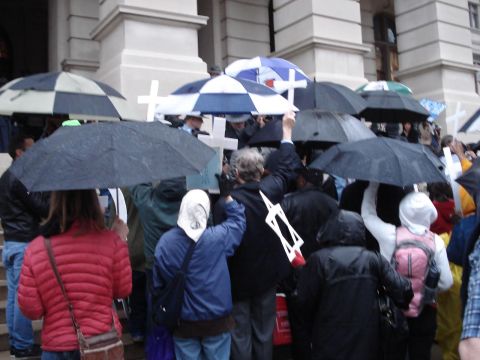An estimated 200 people gathered Monday at the state Capitol in perhaps the most vocal protest yet of Gov. Nathan Deal’s rejection of Medicaid expansion in Georgia.
Georgia’s Moral Monday Coalition, an offshoot of a movement started in North Carolina, landed on the steps of the Capitol on Monday afternoon when protesters braved off-and-on rain showers to urge Deal to expand Medicaid.
The Moral Monday movement, a grass-roots coalition of civil rights groups, churches, labor unions and health care groups, targets public policy issues that negatively affect poor and working-class people.
Though the group is known for nonviolent civil disobedience tactics in North Carolina, the Georgia protest on Monday was vocal but calm. It was the first of many planned for the 2014 General Assembly session, and the organizers said they will follow the lead of their colleagues in Raleigh if Deal and the state’s GOP leadership ignore them.
Georgia NAACP President Francys Johnson, the lead organizer of Georgia’s Moral Monday Coalition, told GHN that he has asked Deal for a meeting to discuss the Medicaid issue, but so far has not received a response.
“Maybe he’ll hear us today,” Johnson said.
The federal Affordable Care Act calls for Medicaid expansion. But the U.S. Supreme Court, in its 2012 decision on the law, declared that expansion was optional for the states. Roughly half have decided against such a move.
Deal has been steadfast in rejecting Medicaid expansion, citing the financial burden on the state. Republican legislative leaders have echoed that sentiment, and with the GOP firmly in control of the state General Assembly, not much is expected to happen on the expansion during the new session.
Still, state Sen. Vincent Fort (D-Atlanta), one of many speakers Monday, left no doubt the protesters intend to push their agenda in subsequent rallies. “We are serious about nonviolent civil disobedience,” he said. “Some of us are going to jail.”
The protesters said rejecting expansion unfairly denies Georgia’s working poor the opportunity for good health.
People who earn between 100 percent and 400 percent of the federal poverty level income can qualify for subsidies in the insurance exchange. But those under that level get no discounts in states that don’t expand Medicaid.
A poll released Sunday by the AJC indicated that 57 percent of Georgians favor expanding Medicaid coverage. The findings are similar to other polls in the state.
Dr. Otis Brawley, chief medical officer of the American Cancer Society and a physician at Grady Memorial Hospital in Atlanta, was a speaker at the rally. “Health care is a civil right and I believe we have a moral obligation” to provide access to it, he told GHN.
“An investment in health care is an investment in the economy. A lot of folks don’t understand the suffering caused by a lack of access to health care,” Brawley added.
The Moral Monday protesters tried to dramatize that claim of suffering. At the end of the rally, one by one, they placed Christian crosses, Jewish Stars of David and Islamic crescents on the steps to symbolize what they said are the lives that will be lost in Georgia this year because of the lack of expanded Medicaid coverage.

